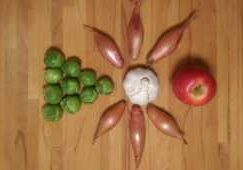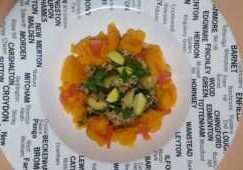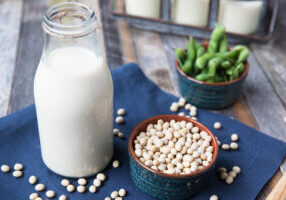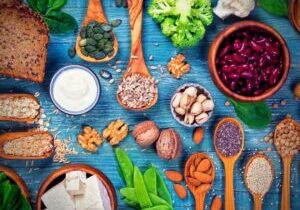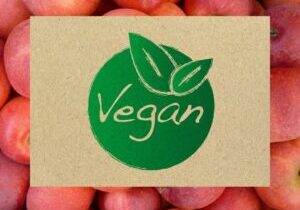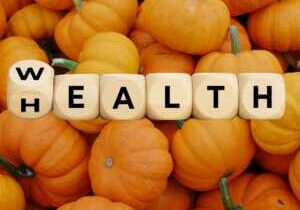I love answering questions about the plant-based way of eating! Especially when they indicate that good health is driving the interest. This question comes my way frequently and in many forms: ‘How can I be sure I am getting all the nutrients I need? I don’t want to forever be looking things up.’
I know that feeling! That’s why, in The Contented Vegan, I’ve introduced simple steps you can take to build a healthy vegan diet – without having to count molecules.
The Four Cornerstones
I summarize The Four Cornerstones to vegan good health in this sentence: ‘Eat a variety of whole, plant-based foods that are locally or organically grown and in season where you live.’
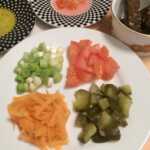 The four underlined topics are the Cornerstones. When you eat in this way most of the time, you are more likely to obtain the greatest possible nutrient value from your food. I suggest you also include a food product such as yeast extract or nutritional yeast flakes, which can provide useful amounts of vitamin B12, a widely recommended supplement. Otherwise, The Four Cornerstones, which are discussed at more length in my book as well as here, will help you stay relaxed while you build a nutritious way of eating.
The four underlined topics are the Cornerstones. When you eat in this way most of the time, you are more likely to obtain the greatest possible nutrient value from your food. I suggest you also include a food product such as yeast extract or nutritional yeast flakes, which can provide useful amounts of vitamin B12, a widely recommended supplement. Otherwise, The Four Cornerstones, which are discussed at more length in my book as well as here, will help you stay relaxed while you build a nutritious way of eating.
The Twelve Vegan Food Groups
You might also have a look at The Twelve Vegan Food Groups chart, here. The Twelve help you because they organize food according to what plant or part of the plant you see when you shop for food. Here’s how it works:
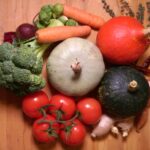 First, you briefly look at the chart then, while out shopping, select foods that are clearly different types or parts of a plant. This ensures variety, almost without trying, and is a rather joyous way of shopping, too. Variety in your diet is perhaps the most important matter to attend to initially, as it naturally extends the range of nutrients available to you. When you regularly eat something from each of The Twelve groups, you can relax and be assured that you are getting a wide range of nutrients over the course of a week or so.
First, you briefly look at the chart then, while out shopping, select foods that are clearly different types or parts of a plant. This ensures variety, almost without trying, and is a rather joyous way of shopping, too. Variety in your diet is perhaps the most important matter to attend to initially, as it naturally extends the range of nutrients available to you. When you regularly eat something from each of The Twelve groups, you can relax and be assured that you are getting a wide range of nutrients over the course of a week or so.
Plant-only Bonus Ingredients
There is another category of health-giving substances in plant-based foods. Phytochemicals are not technically called nutrients, but they act in powerful and beneficial ways to support good health.
Phyto means ‘plant’ and phytochemicals are substances found only in plants. They influence the effect of the vitamins and minerals within your diet. Sometimes they modify, limit or control the effect of a nutrient; at other times they seem to boost or enhance a nutrient’s effect.
You will have heard of phytochemicals by names such as flavours, pigments and anti-oxidants, for example. These are a few of the clear categories of these amazing plant substances. In fact, currently, there are thousands of known phytochemicals; so many that not all of them yet have names!
Eating unprocessed or whole foods is likely to maximize both the nutrient and the phytochemical content of your diet. This is especially so because, it is now realized, phytochemicals do not appear to act in the same powerfully beneficial way when they are manufactured or extracted and then taken as supplements. In other words, they act best when they remain part of the plant, which is where they are when you eat whole foods.
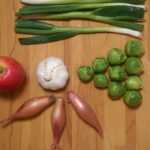 Foods that are locally grown often are also organic, or nearly so. This way of growing food plants aims to enrich the quality of the soil and consequently the nutrient value of the crops grown from it. Local produce generally is fresher and therefore retains more nutrient value, which can otherwise be lost during travel and storage. Locally grown foods tend to be harvested when they are ripe, which makes them in season foods, too. Again, freshness, ripeness and quality greatly enhance the nutrient profile of a food.
Foods that are locally grown often are also organic, or nearly so. This way of growing food plants aims to enrich the quality of the soil and consequently the nutrient value of the crops grown from it. Local produce generally is fresher and therefore retains more nutrient value, which can otherwise be lost during travel and storage. Locally grown foods tend to be harvested when they are ripe, which makes them in season foods, too. Again, freshness, ripeness and quality greatly enhance the nutrient profile of a food.
You will see that a healthy, vegan diet can be built – quite quickly and easily – by employing these tools. Using The Four Cornerstones and The Twelve Vegan Food Groups together makes choosing your food easy and relaxed, leaving you confident that you are obtaining wide-ranging nutrient value from your food choices.
Nutrients Feed Good Health
As you probably realize, the nutrient value of your food is what supplies your body with the materials it needs to create good health. Yes, we need calories to supply energy; we need protein to help build and repair our tissues. But the abundance of vitamins, minerals and phytochemicals in plant foods are what our body actively seeks from our diet even after our protein and energy needs are met.
 It is likely that the tendency to over-eat is an expression of the body’s active search for nutrients. When you consider that highly-processed foods often are nearly devoid of nutrients (but high in calories), you will understand that eating another doughnut or packet of fried snacks is not going to provide a feeling of sufficiency. The body knows when it is lacking in nutrients! It encourages or even drives you to eat until it finds them. The Four Cornerstones and The Twelve Vegan Food Groups help to build a diet that provides nutrients, in abundance, without the need to over-eat.
It is likely that the tendency to over-eat is an expression of the body’s active search for nutrients. When you consider that highly-processed foods often are nearly devoid of nutrients (but high in calories), you will understand that eating another doughnut or packet of fried snacks is not going to provide a feeling of sufficiency. The body knows when it is lacking in nutrients! It encourages or even drives you to eat until it finds them. The Four Cornerstones and The Twelve Vegan Food Groups help to build a diet that provides nutrients, in abundance, without the need to over-eat.
It is no surprise that I heartily recommend a fully plant-based way of eating, but I encourage you to take your time making the switch. A gradual shift gives you time to learn about good foods, new foods and great cookery methods – all of which will help you succeed in building a delicious, healthy new diet.
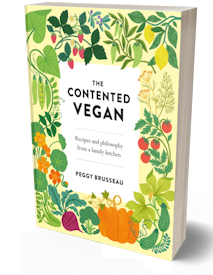
THE CONTENTED VEGAN is a complete guide to the emerging vegan lifestyle. Based on two decades experience of raising a vegan family.
Read Peg's Newsletter...
It's free & fun!
I don’t know if you find it hard to remember web links that are impossibly long and full of gobbledygook?
If you are, then I’ve got some good news…
We’ve made it incredibly easy for you to share a link to my book with your friends – in a way that doesn’t require a degree in programming!
Simply give them this link–
“get.veganbook.today”
No www or anything else – just get dot veganbook dot today. That’ll do the trick – try it!



